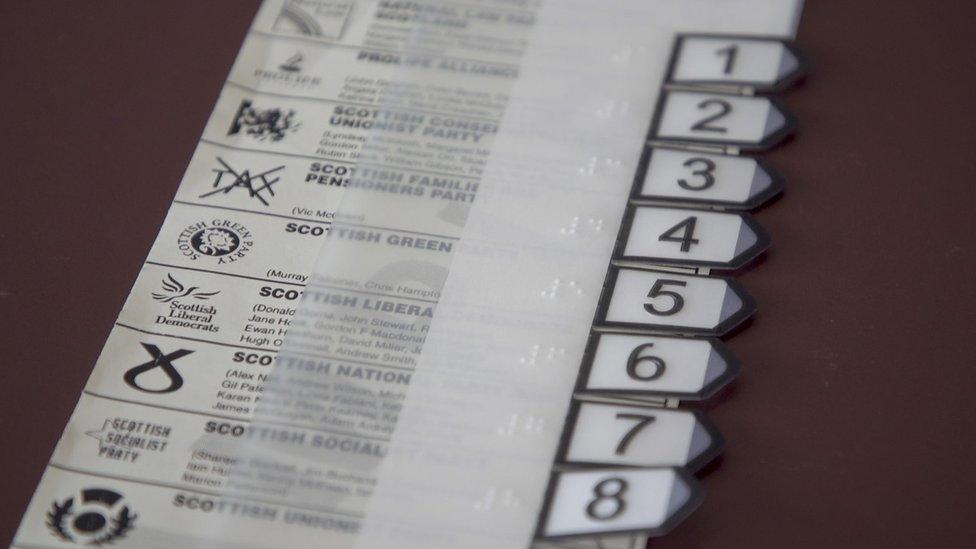Blind voter: 'My right to a secret ballot was gone'
- Published

Vicky Haylott feels she was denied the right to a secret ballot in the recent Scottish Parliament election
Vicky Haylott, who is totally blind, was among voters across Scotland who went to the polls last week in the Scottish Parliament election.
However, she and other visually-impaired people have raised concerns about how accessible the process was.
"I arrived at the polling station with my dad and he was instantly asked, on my behalf, if he would be voting for me and would he like to fill out a form.
"I interrupted everyone and said 'no actually I'm going to vote myself'," she told BBC Scotland.
According to Electoral Commission guidelines, external, additional support should be in place at polling stations for people who are blind or visually impaired.
A larger-print version of the ballot paper should be available and also displayed on the wall.
A tactile device should also be available. This is an overlay which sits over the ballot paper and has tactile and braille numbers associated with each candidate. A member of staff at the polling station can read out the list of candidates and the voter then folds back the appropriate flap in order to make their choice in secret.
However, at 40-year-old Vicky's polling station this process did not happen as it should have.
"The staff didn't seem to know exactly what was to be done with the template," she said.
"Because there were 20 candidates on our ballot paper, it didn't fit on the little shelf in the polling booth and I was asked who I wanted to vote for so she could tell me the number of the candidate that I wanted to vote for.
"My right to a secret ballot was basically gone in that situation and I think that is the main issue for me."

A tactile overlay should be available at polling stations for blind and visually-impaired people
And Vicky's experience was not unique.
James Adams, director of RNIB Scotland, said: "I think it is very frustrating. There is some level of anger because if you boil it all down it means there is a high chance that people in the polling station know how you are going to vote, which just goes against all the principles of our democracy."
He said more needed to be done to ensure the voting process was more accessible in the future.
"There is a desire to work with the various authorities to make sure that we fix it once and for all," he added.
The Electoral Management Board for Scotland said that returning officers have a duty to ensure that a visually-impaired elector can vote without assistance using the tactile voting template provided.
A spokesman added: "Staff are trained to know how to use this template and be able to explain its use to blind or partially-sighted voters.
"After each election there are detailed reviews by the Electoral Commission and also by the EMB to ensure that lessons are learned to improve the service in the future."
The Electoral Commission said it had been working with local authorities to ensure sure that the voting process was as accessible as possible.
Sarah Mackie from the Electoral Commission told BBC Scotland: "It is always disappointing to hear when a voter has had difficulty in exercising their right to vote.
"I think there have been great strides in the last 20 years, but clearly we can't rest on our laurels and more work needs to be done."
For Vicky Haylott, lessons must be learned.
She said: "I'd like to see some kind of electronic voting system for disabled people.
"In 1872 the secret ballot was introduced and I feel that, as blind people, we still don't have that."

